|
|
|
Sort Order |
|
|
|
Items / Page
|
|
|
|
|
|
|
| Srl | Item |
| 1 |
ID:
171163


|
|
|
|
|
| Summary/Abstract |
By emphasizing concepts such as resilience and local ownership, recent updates in the EU's foreign policy strategy have marked a narrative turn and signaled a shift in EU external governance toward its neighborhood. This article has two aims. First, we unpack the EU's conceptual understanding of resilience and local ownership as reflected in its recent strategic documents. Second, we examine the implications of the EU's narrative turn on actual policy practices in Eastern Partnership countries. We highlight a gap between the EU's broad understanding of resilience and local ownership and the narrow operationalization of these concepts in the EU's eastern policy. The article shows that the EU continued relying on the previously established policy frameworks, according to which resilience develops through approximation with EU templates. This strong path dependence precluded any effective policy turn toward local ownership.
|
|
|
|
|
|
|
|
|
|
|
|
|
|
|
|
| 2 |
ID:
171158
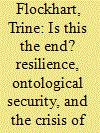

|
|
|
|
|
| Summary/Abstract |
The liberal international order is widely believed to be resilient because it has always had a remarkable ability to adapt in response to crisis and adversity. Today, the liberal order is clearly in crisis, and yet decisive action to adapt it is not taking place. Using insights from the resilience-thinking literature supplemented with insights from the literature on ontological security, the article seeks to understand why agents often fail to take decisive adaptive action, even when such action is clearly needed. The article develops a conceptual framework, including agent-level theorizing, to better understand agent motivation for undertaking adaptive action and a conception of the social site for resilience as an ideal-type social domain in which resilience is constituted and defined in the interaction between patterns of power, principles, and practice. The article contributes to resilience-thinking by demonstrating a plausible link between agents’ ability to invoke their agency and their ontological security.
|
|
|
|
|
|
|
|
|
|
|
|
|
|
|
|
| 3 |
ID:
171161


|
|
|
|
|
| Summary/Abstract |
The article provides a critical overview of the rise of resilience at the European Union (EU) level and to what extent its adoption is reshaping the terms of the EU’s peacebuilding interventions. It argues that resilience offers a four-fold contribution to promoting sustainable peace: (1) a focus on complexity; (2) a systems approach; (3) a shift toward local capacities; and (4) an emphasis on human agency. The article then applies this framework to assess the implementation of the EU’s “resilience turn” since the adoption of the EU Global Strategy in 2016. Focusing on the EU’s discourse and its peacebuilding practices in the Western Balkans, the evidence suggests that the EU has only embraced a systems/integrated approach, while neglecting deeper understandings of complexity, local capacities and human agency. As a result, the contribution of resilience to EU peacebuilding remains limited.
|
|
|
|
|
|
|
|
|
|
|
|
|
|
|
|
| 4 |
ID:
171159
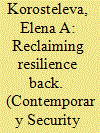

|
|
|
|
|
| Summary/Abstract |
Resilience seems to have become “the everyday” covering many aspects of our lives and the policy agenda of major international institutions. However, despite the upsurge in its popularity, are we sure we understand resilience well enough to make full use of its potential? Is resilience just about an entity and its qualities, the knowledge of which could help us improve its response to adversity? Or is it more about resilience as governance-thinking which could enable local communities to self-organize to build life they have reason to value, with external assistance as necessary? Tackling these fundamentals is important, not least to ensure that resilience is not another buzzword but an opportunity to make governance more adaptive. This article argues that resilience cannot be engineered externally, and requires local communities, aware of their own strength and capacities, to actualize their own potential in their strife for “good life,” the way they specify.
|
|
|
|
|
|
|
|
|
|
|
|
|
|
|
|
| 5 |
ID:
171156
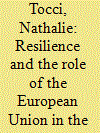

|
|
|
|
|
| Summary/Abstract |
The idea of resilience in EU academia and practice predates the EU Global Strategy. But it is with the 2016 EUGS that resilience was elevated into one of the five guiding principles for the EU’s role in the world. This article recounts the origins of the concept in the context of European foreign policy. Resilience reflected the implicit goal of the EUGS to foster a more joined-up approach to European foreign policy, it epitomized the philosophy of principled pragmatism enshrined in the EUGS, and it captured the transformative approach to complex change advocated by the EU. The implementation of the EUGS over the last three years has been a story of lights and shadows. However, the idea of resilience lives on also and perhaps even more importantly because of its changing interpretation in the European policy debate.
|
|
|
|
|
|
|
|
|
|
|
|
|
|
|
|
| 6 |
ID:
171155


|
|
|
|
|
| Summary/Abstract |
The article introduces the special issue by exploring the full potential of “resilience” as a governing regime of the European Union and other international institutions. Developing a more comprehensive understanding of the concept is important for three reasons. One, it gives an opportunity to see resilience not only as a quality of a system, but also as a way of thinking, and a process inherent to “the local” that cannot be externally engineered. Two, as an analytic of governance, resilience challenges the current fundamentals of top-down global governance and refocuses it on the role of “the local” and “the person” to make it more responsive to people’s needs. Three, resilience cannot be understood without exploring where and how it is constituted—that is, without unpacking “the local” ordering domain to see how ontological insecurity and a sense of “good life” could contribute to the emergence of more adaptive governing systems.
|
|
|
|
|
|
|
|
|
|
|
|
|
|
|
|
| 7 |
ID:
171160
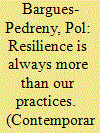

|
|
|
|
|
| Summary/Abstract |
This article examines the response to the crisis of liberal statebuilding in conflict-affected societies since the end of the 2000s. It shows how both resilience policy approaches and academic critical understandings are dissatisfied with the implementation of policies and programs, which seem to fail time and again. That is, there is a widespread perception that resilience is “always more” than what current approaches are providing. In consequence, it is assumed that international interventions require even more locally-sensitive initiatives that are in tune with local needs; new and better technologies, for instance, digital maps to assist practitioners in obtaining sheer volumes of information and accurate representations of space; and programs that are open-ended and flexible. The article cautions that by assuming that satisfactory outcomes are yet to come (i.e., that resilience, or a desired outcome such as peace and security, is still lacking), policy and critical approaches are reproducing and legitimizing failure, furthering neoliberal governance and cementing a profound skepticism.
|
|
|
|
|
|
|
|
|
|
|
|
|
|
|
|
| 8 |
ID:
171157
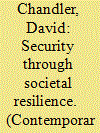

|
|
|
|
|
| Summary/Abstract |
The concept of societal resilience has rapidly spread throughout the policy world, driven by the desire to use systems theories and process understandings to develop new security approaches for coping, bouncing-back, and adaptive improvement in the face of shocks and disturbances. However, this article argues that under the auspices of the Anthropocene, the assumptions and goals of societal resilience become problematic. This is because external interventions often ignore feedback effects, meaning that attempts to resolve problems through focusing upon enabling and capacity-building can be seen as counterproductive “fire-fighting” rather than tackling causation. Even more “alternative” or “community-based” approaches, relying upon interventions to enable so-called “natural” processes, either through an emphasis on local and traditional knowledge or new monitoring technologies, constitute problems for resilience advocacy: firstly, the problem of unrecognized exploitation; and secondly, the problem of continuing to sacrifice others to maintain unsustainable Western modes of consumption and production.
|
|
|
|
|
|
|
|
|
|
|
|
|
|
|
|
| 9 |
ID:
171162


|
|
|
|
|
| Summary/Abstract |
Building “resilience” to insecurity and crisis is high on the European Union (EU) agenda. EU uptake of this buzzword is especially significant with regard to migration and forced displacement. Uncertainty, however, remains about what resilience is, how it translates into practice, and what its implications are. In this article, we analyze EU humanitarian and development policies and provide empirical insight into resilience-building in Jordan and Lebanon. We show that EU resilience thinking highlights strengthening the humanitarian-development nexus, responsibilizing crisis-affected states, and framing refugees as an economic development opportunity for refugee-hosting states. We also find that how resilience translates into practice depends on the local context and interests of the actors involved. For the EU, resilience-building is primarily a refugee containment strategy that could jeopardize the stability of refugee-hosting states. We conclude that resilience-building in Jordan and Lebanon may ultimately threaten rather than safeguard the security of Europe.
|
|
|
|
|
|
|
|
|
|
|
|
|
|
|
|
|
|
|
|
|